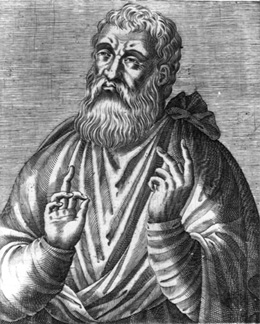Difference between revisions of "Justin Martyr"
(Moved a quote to the Creeds page (I had previously uploaded it to this page).) (Tag: 2017 source edit) |
(Moved the contents of the Quotes section to wikiChristian web-pages to which they apply. Eg moved the free-will quote to the Arminianism page.) (Tag: 2017 source edit) |
||
| (3 intermediate revisions by the same user not shown) | |||
| Line 29: | Line 29: | ||
==Quotes== | ==Quotes== | ||
| − | |||
| − | |||
| − | |||
| − | |||
| − | |||
| − | |||
| − | |||
| − | |||
| − | |||
| − | |||
| − | |||
| − | |||
| − | |||
==External Links== | ==External Links== | ||
Latest revision as of 16:24, 4 June 2024
| Justin Martyr | |
| RELATED TOPICS | |
| SERMONS, ESSAYS AND OPINIONS |
|
| CONTENTS | Contents |
Justin Martyr (Justin of Caesarea) was an early Christian apologist (a person who defends the truth of Christianity). His works represent the earliest surviving Christian apologies of notable size. He lived from around 100 AD to 165 AD.
Life
Most of what is known about the life of Justin Martyr comes from his own writings. He was born at Flavia Neapolis (modern Nablus) in Palestine. The city had been founded by Vespasian in the aftermath of the destruction of Jerusalem in 70 AD. According to church tradition Justin suffered martyrdom at Rome under Marcus Aurelius when Rusticus was prefect of the city (between 162 and 168).
Justin Martyr called himself a Samaritan, but his father and grandfather were probably Greek or Roman, and he was brought up a pagan. It seems that he had property, studied philosophy, converted to Christianity, and devoted the rest of his life to teaching what he considered the true philosophy, still wearing his philosopher's gown to indicate that he had attained the truth. He probably travelled widely and ultimately settled in Rome as a Christian teacher. While he was at Rome, he debated opponents of his belief, such as Crescens the Cynic. He was later executed in 165 A.D. for his no-compromise faith in Christianity.
Writings
The earliest mention of Justin is found in the Oratio ad Graecos by Tatian who called him "the most admirable Justin,". Tatian quoted a saying of his, saying that the Cynic Crescens laid snares for him. Irenaeus (Haer. I., xxviii. 1) spoke of his martyrdom, and of Tatian as his disciple; he quoted him twice (IV., vi. 2, V., xxvi. 2), and showed his influence in other places. Tertullian, in his Adversus Valentinianos, called him a philosopher and martyr, and the earliest antagonist of heretics. Hippolytus and Methodius of Olympus also wrote about him. Eusebius of Caesarea dealt with him at some length (Church History, iv. 18), and named the following works:
- The First Apology addressed to Antoninus Pius, his sons, and the Roman Senate;
- A Second Apology addressed to the Roman Senate;
- The Discourse to the Greeks, a discussion with Greek philosophers on the character of their gods;
- A Hortatory Address to the Greeks;
- A treatise On the Sovereignty of God, in which he makes use of pagan authorities as well as Christian;
- A work entitled The Psalmist;
- A treatise in scholastic form On the Soul
- The Dialogue with Trypho
Quotes
External Links
Return to Apologists | Famous Christians
